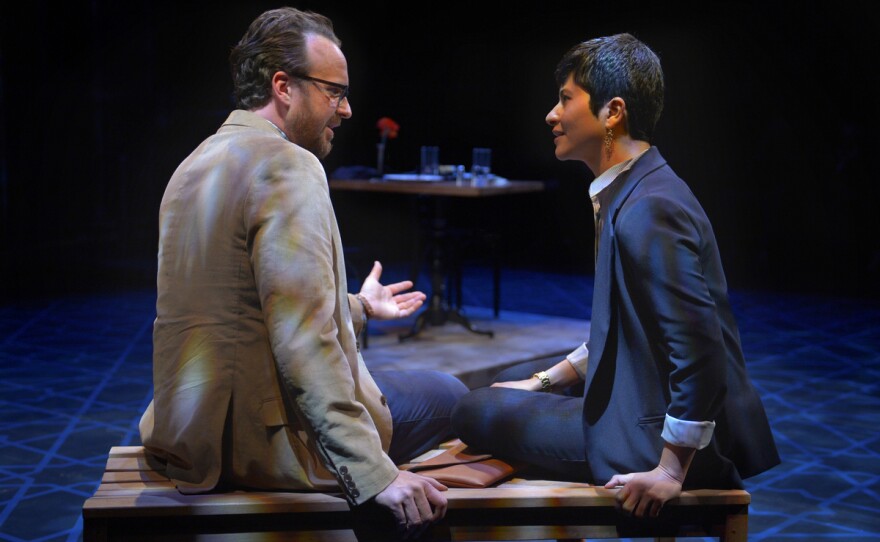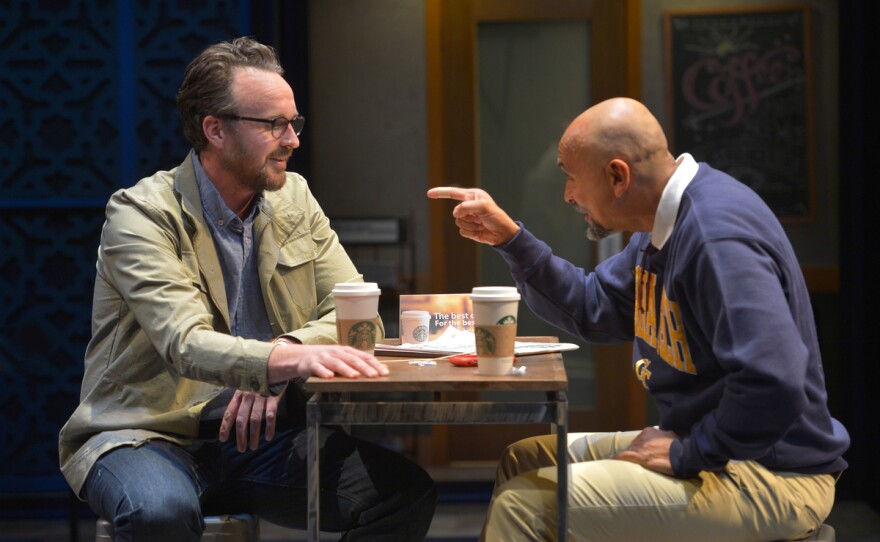In a black box rehearsal space at the La Jolla Playhouse, actress Monika Jolly works through the opening monologue of the play “The Who and the What,” a comedy about clashing generations in a Muslim American family.

Playwright Ayad Akhtar watches Jolly from a table piled with scripts. He’s wearing a baseball cap and drinking coffee. He follows along with Jolly, mouthing the dialogue as she delivers his writing.
In 2013, Akhtar won the Pulitzer Prize for drama for his play "Disgraced." Akhtar chronicles the Muslim American experience in his plays and books. He’s done that mostly through male protagonists. But not in this play. This time, his main character is a brilliant young Muslim woman named Zarina, whose mother died a few years ago. Her traditional father runs a successful cab company in Atlanta and dotes on his two daughters.
But Zarina is a feminist. She's not traditional like her father and sister, though she doesn't reject Islam either. "She’s straddling two different worlds in a way," said Akhtar. "She’s straddling traditional Pakistani culture and cutting edge modern life."
In the play, Zarina is writing a book about the Prophet Muhammad. Its content wreaks havoc within the family.
"She’s writing a humanizing portrait of the prophet," Akhtar said. "She’s going back into the sources and uncovering a human struggle in the prophet’s life that makes him look a lot more human than maybe some people are comfortable with."
"Ayad’s really brave," director Kimberly Senior said. "I don’t know that you or I can really understand how brave he is."
Writing a book or a play that could be interpreted as critical of the Prophet Muhammad is a dangerous endeavor. Akhtar, who grew up a devout Muslim but does not practice today, says he doesn’t worry about that. "I don’t because I feel that the folks that experience it recognize that there’s a deep respect and love for the tradition as well as a critique of it," Akhtar explained.

Senior says Akhtar is tackling a global issue.
"How does Islam — or by extension any of our religions that were written centuries ago — how do they interface in the modern world," said Senior. "That’s a really combustible question."
"The Who and the What" was presented last year at the Playhouse's DNA New Work Series, a new play development initiative that involved workshops and readings of new works. Gabriel Greene is the Playhouse's director of new play development. His mother saw a production of "Disgraced" in Chicago, called Greene, and insisted he find a way to work with Akhtar (Always listen to your mother!).
Greene began reading all of Akhtar's writing. He started bugging the playwright's agent, and eventually got his hands on a rough draft of "The Who and the What." Greene knew it was right for the DNA series. "It’s a play with heart, but it’s also a play with teeth," Greene said. "And it’s a play with a brain."
Greene says the Muslim community largely is underrepresented in many art forms.
"Not just in theater, but in any medium. When they are represented," he added, "it’s generally in a stereotypical way."
Akhtar says he doesn’t try to dispel Muslim stereotypes. "I think there’s a perceived responsibility for any Muslim artist of any visibility to perform some corrective for what’s out there. I think that can end up being more of a PR project than an artistic work," Akhtar said.

Despite its serious themes, “The Who and the What” is a comedy and it's funny. Zarina’s father, Afzal, played by Bernard White, generated a lot of laughs at a recent dress rehearsal.
Afzal tries to find Zarina a husband by posing as her on a dating website called Muslimlove.com. He even meets with her suitors to screen them.
At one point in our interview, Akhtar does his best impersonation of Zarina’s father, adopting a thick Pakistani accent: "A woman likes to know she’s with a man. A strong man, with a strong hand," he laughed, then added: "Cash doesn’t hurt. Can make up for some of the other things."
Akhtar says Zarina is not unlike generations of young Muslims around the world who are also searching for a balance between modernity and tradition.
"Zarina is trying to negotiate what is actually a very rigid and mostly male-dominated tradition and culture and — without rejecting it — is beginning to try and find room inside it," Akhtar explained.
"And that," he added, "makes her a deeply inspiring character."
"The Who and the What" runs through March 9 at the La Jolla Playhouse.






